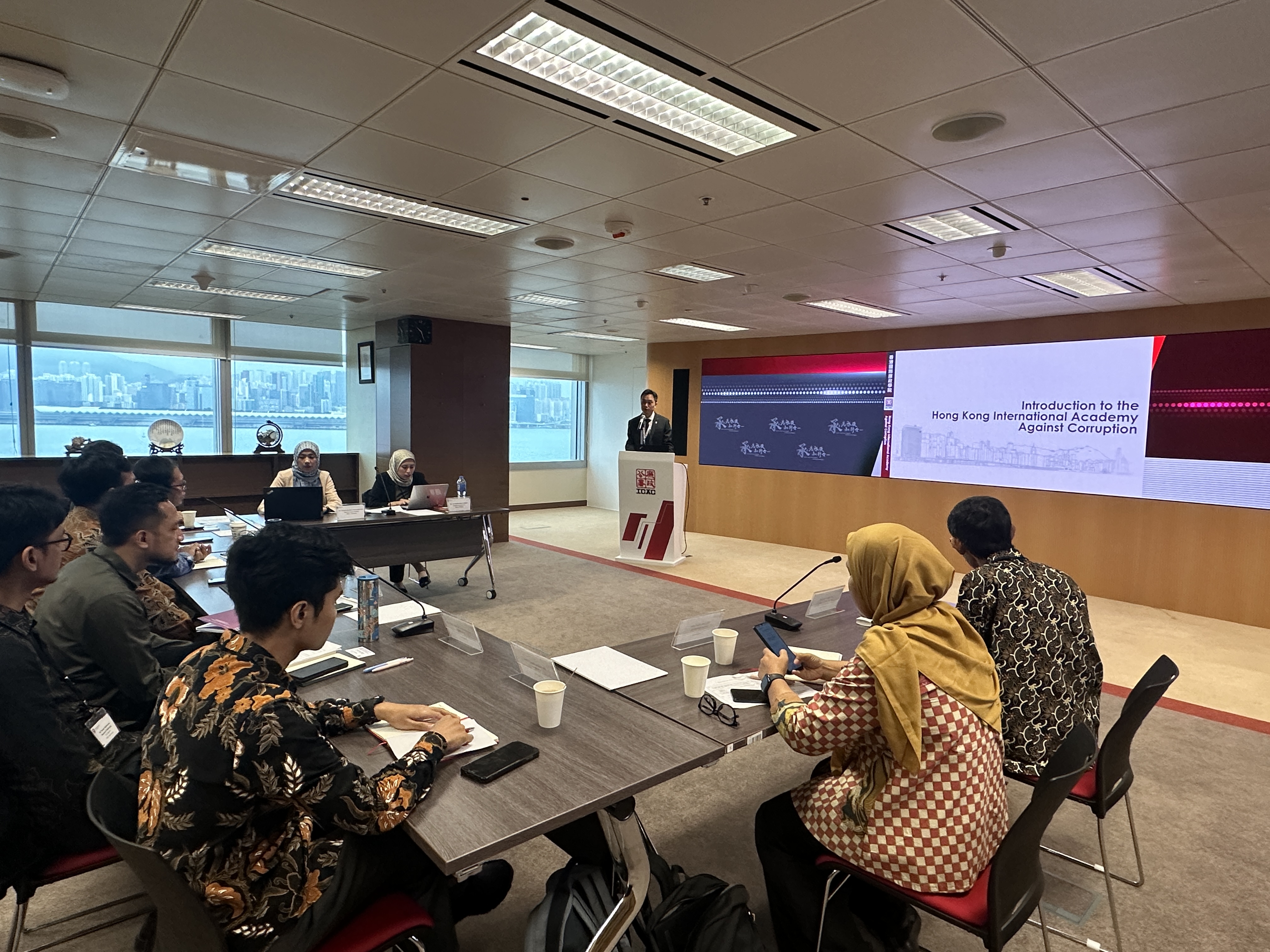ICAC chief calls on support for ‘Beijing Consensus’ at UN’s global anti-graft meeting to deepen law enforcement co-operation
2024-9-27
ICAC Commissioner, Mr Woo Ying-ming, called on international counterparts to support the “Beijing Consensus on Law Enforcement Co-operation and Denial of Safe Haven for Corruption” (“Beijing Consensus”) adopted at the meetings of the Global Operational Network of Anti-Corruption Law Enforcement Authorities (GlobE Network) of the United Nations held in Beijing to strengthen international law enforcement co-operation and unite against corruption by leveraging partnerships.
Mr Woo, along with Deputy Commissioner, Mr Ricky Yau Shu-chun, and other ICAC officers participated in the Eighth Steering Committee Meeting and Fifth Plenary Meeting of the GlobE Network this week. The five-day meetings held in Beijing by the UNODC in collaboration with the National Commission of Supervision, which commenced on Monday (September 23), attracted participation of around 400 GlobE Network members from 105 countries and international organisations.
The GlobE Network was established under the auspices of the United Nations Office on Drugs and Crime (UNODC) in 2021 to facilitate co-operation among anti-corruption law enforcement authorities to prevent and combat corruption. Its members include over 200 authorities worldwide.
At the Plenary Meeting, participants adopted the “Beijing Consensus” to strengthen international law enforcement co-operation in graft-fighting and denying safe haven for corruption. Delivering a speech on “Fostering global anti-corruption partnership” at its High Level Forum, Mr Woo said, “The adoption of the ‘Beijing Consensus’ marks a new era of collaborative efforts against corruption and provides guidance to anti-corruption agencies worldwide to sustain our commitment and intensify our efforts to strengthen international law enforcement co-operation.”
Citing an ancient Chinese adage “The going is difficult when doing it alone; the going becomes easier when doing it with many others”, Mr Woo encouraged participants to reach consensus, leverage partnerships and enhance capacity in graft fights. Mr Woo added that the ICAC had all along worked with international counterparts to eradicate corruption by concerted efforts. Recently, the Commission had concluded Memoranda of Understanding on enhancing anti-corruption co-operation with the UNODC, as well as anti-graft agencies from six countries. In the past few years, the Commission had also organised over 60 capacity building programmes for over 2,600 graft-fighters from nearly 70 countries.
On Wednesday morning (September 25), Mr Li Xi, Member of the Standing Committee of the Political Bureau of the Communist Party of China Central Committee cum Secretary of the Central Commission for Discipline Inspection, met with Mr Woo as well as anti-corruption chiefs of other countries who took part in the High Level Forum.
In addition, Mr Woo, in his capacity as President of International Association of Anti-Corruption Authorities (IAACA), addressed the Plenary Meeting of the GlobE Network. He called for closer collaboration and greater synergies in the fight against corruption between the two organisations and member agencies attending the meeting. Established in 2006, the IAACA was the first global institution to promote the effective implementation of the United Nations Convention Against Corruption and foster international anti-corruption collaboration amongst anti-corruption agencies worldwide. With a membership of over 170 anti-corruption agencies, the IAACA serves as an observer at the current GlobE Network meetings.
In the same afternoon, Mr Yau spoke at a panel discussion themed “Denial of safe haven for corruption”, expounded on leveraging international co-operation in recovering corrupt assets and bringing the corrupt to justice. Anti-graft agencies should strive to prevent criminals from escaping justice by fleeing or funnelling corrupt assets to other countries.
During the GlobE Network meetings, Mr Woo and the ICAC delegation met with UNODC officials, including Director of Division of Treaty Affairs, Mr John Brandolino, and Chief of Corruption and Economic Crime Branch, Ms Brigitte Strobel-Shaw. Bilateral meetings were respectively held with representatives of anti-corruption authorities from 12 countries, namely Algeria, Costa Rica, Dominican Republic, Hungary, Madagascar, Mauritius, Pakistan, Papua New Guinea, South Africa, Sri Lanka, the United Arab Emirates and Zambia, as well as Professor Slagjana Taseva, new Dean of the International Anti-Corruption Academy based in Austria to exchange graft fighting initiatives and explore future collaboration.
The ICAC delegation include Mr Woo, Mr Yau, Director of Corruption Prevention, Mr Bryan Chong Ka-lok, Deputy Director of Hong Kong International Academy Against Corruption, Ms Irene Wang Yien, and Principal Investigators, Ms Bonnie Wong Kar-man and Mr Gary Wong Hon-kit. Mr Woo, Mr Yau and some of the delegates returned to Hong Kong Wednesday night, while other members will return tomorrow morning.









